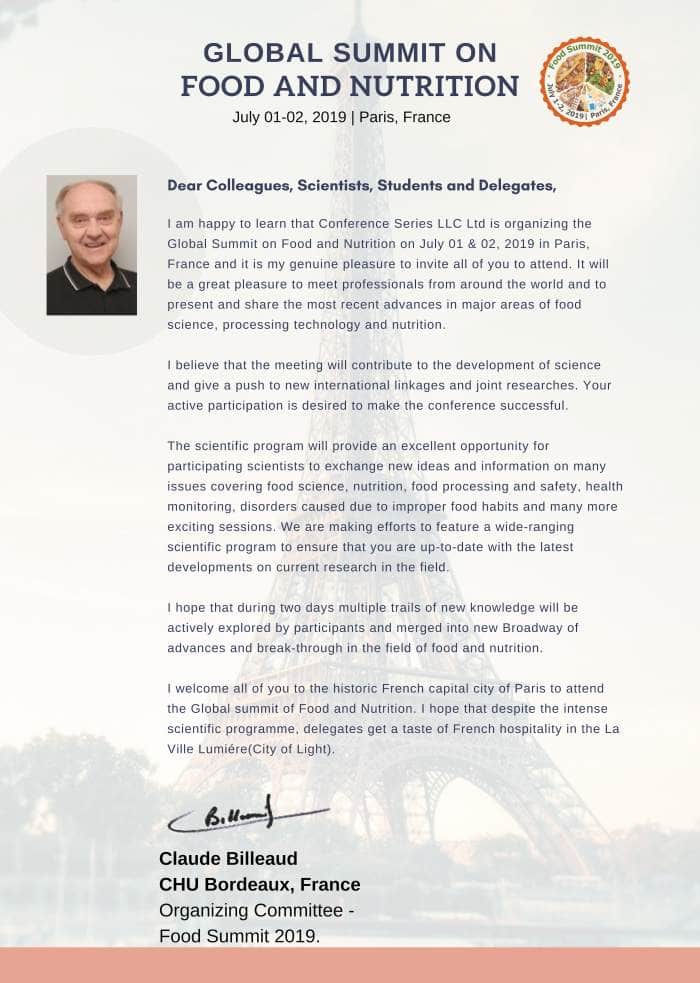Theme: Surveying the composite relationship between diet and health
Food Summit 2019
We are what we eat. Food is what makes our body. By definition, any substance that's capable of being consumed or drunk and that nourishes the body by meeting the requirements for energy and correct functioning is termed food.
Nutrients, on the other hand, are compounds in foods which are essential to life and health, providing energy, the building blocks for growth and repair and substances necessary to regulate chemical processes within the body.
There are five major nutrients: Carbohydrates, Proteins, fats, Vitamins and Minerals. Nutrition is the science that involves the study of nutrients required by the Human body for it to function normally; maintaining the highest level of both physical and mental health is called Nutrition.
The Global Summit on Food and Nutrition conference, to be held in Paris, France on July 1st & 2nd, 2019 will aim to boost the understanding we have of the relation between Food, Nutrition and its consequences on public health in accordance with the theme: surveying the composite relationship between diet and health.
"Nutrients are the substances in food that are essential for the development, growth, and maintenance of the Human body. Meaning that, if a nutrient is not present, it affects body functions and therefore affects human health. When nutrient intake does not regularly meet the nutrient needs dictated by the cell activity, the metabolic process slows down or even stops."
- Perspectives in Nutrition, Wardlow and Insel.
Diet refers to our daily absorption of food. Food acts as the primary medicine which maintains health and prevents diseases. However, the present world scenario calls for deliberations and discussions about a healthy diet and its access to the human population which is battling a major crisis. According to the World Hunger Statistics, roughly 800 million people in the world do not have access to proper food, which roughly estimates to 1 in 9 people!
Living in a world with access to the internet anytime anywhere, information is available at everyone's fingertips. However, nutrition congress 2019 provides its delegates with an ideal setting for a serendipitous rendezvous to discover what they did not know they needed to know. Nutrition conferences 2019 tracks are related to food habits, availability of food and nourishment, nutritional value and the importance of diet on health. Food conferences 2019 are dedicated to incite discussions that promote innovations and fresh perspectives to the existing situation. It welcomes professors, research scholars, dieticians, nutritionists, doctors, industrial professionals, students, social workers and groups to be a part of it as we deliberate on the fight to making healthy diet accessible to all.
Why attend?
The Global Summit on Food and Nutrition conference 2019 is set to be among the World’s leading Food and Nutrition Meeting.
The companies dealing with nutritional products and supplements can exhibit their products in the Nutrition exhibition and expo. Nutrition Conference 2019 will comprise of major sessions designed to offer comprehensive lectures that address the tracks.
The benefits provided to the attendees are:
- Certificates will be provided to all speakers, delegates and students.
- Opportunity to meet the world’s renowned people at this event.
- Keynote forums by Prominent Physicians & Professors.
- Best platform for Global business and networking opportunities.
- Oral/Poster presentations by Young Researchers.
- Best poster award for students.
Target Audience:
- Training Institutes
- Universities and College Students
- Nutrition and Food science Associates
- Nutrition based Companies
- Business Entrepreneurs
- Clinical Nutritionists
- Registered Dieticians
- Health-Care Professionals
- Researchers and Scientists
Conferenceseries LLC Ltd strongly believes that Global summit on food and nutrition will provide an opportunity for discussions on Food and Nutrition related challenges in the field of nutrition and food science. It will also help in sponsoring mindfulness and help in undertaking one of the perilous problems of mankind which is related to health-care.
Food Summit 2019 invites the submission of abstracts of original work. Abstracts must be submitted on the understanding that they have not been presented elsewhere (except in the form of a thesis) and are not currently under consideration by another conference. The submitting speaker should ensure that the abstract publication has been approved by all other co-authors.
Modes of Presentation
- Oral presentation
- Poster presentation
Language
All abstracts must be written exclusively in English (including the title, abstract text, author names and affiliations).
Correspondence
Please provide the following:
Presenting author’s contact details including full mailing address, office phone number, email address and fax number
Name(s) of presenting author and co-authors: first name(s) or initials of first name(s), family name (e.g. Jason Wong or J. Wong)
Affiliation details of all authors: Department, institution/hospital, city, state (if relevant), country.
Financial Assistance
As a non-funded organization, Conference Series LLC cannot give any attendee full waiver on Registration and/or Accommodation or provide any grants for travel. However, in special cases, a participant, especially from lower-income & lower-middle-income economies (World Bank Classification for 2019 fiscal year) may apply for financial assistance in writing to the Program Manager for consideration. The decision of a waiver is made by the Organizers based on the applicant's affiliation, abstract and experience. We recommend participants to provide a detailed and up-to-date biography while submission of abstract.
Conference Series LLC also issues a Letter of Acceptance on request to participants who require it to apply for financial assistance at their University/Institution.
Conference Series LLC LTD organizes 3000+ Global events every year across Europe, USA & Asia-pacific regions with support of more than 1000 scientific societies and publishes 800+ Open access journals which contain over 50000 eminent personalities, reputed scientists as editorial board members and reviewers.
VISA Application
We urge the participants to get in touch with the French Embassy in their country to know their requirements. Conference Series LLC will issue a Letter of Attendance to registered candidates if needed for VISA application. However, the Organizing Committee or Conference Series LLC will not be in correspondence with the Embassy/Consulate or the Ministry of Foreign Affairs in case the VISA application of a potential attendee is rejected.
Pediatric nutrition is a branch which deals with the medical and nutritional care of children. Pediatric nutrition is basically a well-balanced diet which is given to children at a young age to complete their daily nutritional intake. A pediatric nutritionist is a person who takes care of the nutritional intake of the infant based on the current health and growth of the child.
The pediatric nutritional needs vary with age, activity and Health conditions of the infant. In paediatrics, Breast feeding plays an important role in the growth rate of children, to build the baby’s internal body parts like brain, immune system and vascular system. Infant diet must consist of all the essential vitamins and minerals which help in development and growth of body muscles and bones. Protein in also required in adequate amount to build muscles.
- Pediatric Obesity
- Pediatric Nutrition for chronic diseases
- Malnutrition
Major Associations and Societies Worldwide:
Pediatric Nutrition Association of the Philippines (IPNAP) | Asia Pacific Infant and Young Child Nutrition Association (APIYCNA) | Nestle Nutrition Institute(NNI) | Abbott Nutrition | Pediatric Nutrition Conference | Pediatric Nutrition Care Association | American Society for Nutrition | Nutritionist Conferences | Nestle S.A. | Nutrition Conferences | Diet Conferences | Clinical Nutrition Conferences | Abbott Laboratories | Neonatology Nutrition Institute | Breast Feeding Conference | Royal FrieslandCampina | List of Nutrition Conference | Baxter International Inc | Pediatric Nutrition Conferences | Neonatology Nutrition Conferences | Clinical Nutrition Conference | Child Growth Conference | North American Society for Pediatric Gastroenterology, Hepatology and Nutrition | Infancy Conferences | Association of Pediatric Gastroenterology and Pediatric Nurses (APGNN) | Child Development Conferences | Academy of Nutrition and Dietetics Position and Practice Papers | Infant Pediatric and Nutrition Association of the Philippines | Kenya Pediatric Association
What you eat matters. You can nourish your skin from both inside and out. Our skin also reflects our eating habits. To maintain healthy skin you can eat fruits and vegetables which are high in antioxidants such as beta carotene (beta carotene is a precursor of vitamin A). Vitamins C, E and A also help in maintaining health of skin.
Skin damage also occurs due to some external factors which include medication and pregnancy. Different people give different advices on what to do to maintain the perfect skin using a specific nutrition plan.
Skin is the largest organ of your body and skin health is dependent largely on your diet. As skin goes through many cycles of renewal and repair, All the required nutrients should be supplied with minerals to help repair and maintain the skin. The skin is mostly exposed to dust, so it undergoes many changes which may lead to various skin diseases like inflammation, pimples, dry skin and other skin disorders.
Clinical nutrition refers to the practice of analysing a persons nutrient intake based on the family or medical history, lifestyle and laboratory results and recommend changes in the diet plan.
A clinical nutritionist also provides advice on changing the diet plan in order to prevent a particular disease or prevent further medical injury.
A clinical nutritionist may work in variety of fields including hospitals, weight management clinics, acute health care centers, pharmaceutical industries, Food companies and sports agencies.
The Basic Nutrition plan comprises macro and micronutrients which are required to meet the daily requirement of the human body depending on the average person’s daily activity and eating preference.
The regular diet ensures that the body gets the daily essential amount of nutrients which are required to perform everyday tasks and keep our body in a healthy condition.
Sports nutrition, on the other hand, is more complex. The sports diet is specially designed for each person depending on their individual training, body type, goal, muscle growth, and strength building.
Sport diet also consists of macro and micronutrient-rich foods, but the requirement of other nutrients are also taken into consideration like creatine (to improve muscle recovery), multivitamin (replenishes the key water-soluble vitamins lost with daily intense training), Fish oil (to maintain the ratio of omega-3 and omega-6 fatty acid), Whey protein (fast absorbing protein) etc. which are used to repair muscle tissues and improve the elasticity of muscles.
Hence the sports diet depends on individual goals and training needs and helps them reach their highest fitness level.
To simply put, food science is the study of food. It involves the study of the physical, biological and chemical nature of food. Food science also comprises evaluation of food processing, packaging and safety. Food Composition Databases exist, which lists detailed information sets on the nutritional value and components of a particular food, which is its carbohydrate, protein, fat, minerals, vitamins and fiber content. The properties of food are our concern and its make-up forms the core of the topics of discussion at Food Summit 2019.
A very recent development, food irradiation involves the use of ionizing radiations as treatment. It is said to be one of the most potent modes of ensuring food safety and additionally increases the shelf-life of food. The most important advantage of irradiation is that it kills all micro-organisms that would otherwise cause foodborne illnesses in humans, which is responsible for 5000 deaths globally each year, despite the high standards we have reached with respect to food safety. At Food Summit 2019, this special track aims to discuss the latest developments in this field.
Irregularity in diet results in eating disorders. Commonly, there are two types of such disorders – anorexia & bulimia. While anorexia involves eating too less, bulimia is caused due to overeating. These disorders are effected upon by mental health, with fear of gaining weight resulting in anorexia. Bulimia on the other hand occurs to people who binge eats, mostly junk food. This too has mental implications as the affected individual has no control over themself to prevent overeating. Eating disorders result in poor health due to discrepancies in the diet. Anorexic people are severely under-weight while overeating causes obesity. Apart from eating disorders, unbalanced components in the diet also lead to cardiovascular diseases and diabetes. A person taking in high volumes of carbohydrates in the form of sugars in their diet can suffer from Diabetes. Excess cholesterol is deposited in the blood vessels, increasing the risk of vascular or cardiovascular diseases, which might even lead to heart attacks!
This track deals with the use of biotechnology in food production and processing industry. Biotechnology has a long history of use in the food industry. For centuries, microbes have been used to manufacture bread, dairy products and alcohol through fermentation. The food biotechnology industry received a major boost with the advancements in the field of genetic engineering. Genetically Modified Organisms (GMOs) are now widely used around the world. Through genetic engineering techniques, the genetic makeup of the food composites can be modified to obtain desirable traits. However, it has been met by resistance from several sections of the society and questions are being asked about their viability and effects on human health. The Global Summit on Food and Nutrition invites researchers to present their findings and discuss the various applications of biotechnology in the food industry.
With an ever-increasing population, it is being predicted that agriculture will not be able to sustain the demand for food by as early as 2050. Single Cell Proteins (SCP) is one of the disruptive developments in modern food industry. As the name suggests, SCPs are single celled or unicellular microorganism cell mass, which is dried and used as protein supplements. It has a high nutritional value since its rich in vitamins and nutrients however high nucleic acid content makes it unsuitable as a replacement to food and is currently limited to use as supplements. Latest developments in the research on SCPs, their bright future prospects and uses are included in the Food Summit 2019 agenda.
Probiotics & Dietary Supplements:
A dietary supplement is a product that supplements the food. It is generally consumed as a tablet or tonic, which contain nutrients, vitamins or any other essential substance that is useful to our body, oftentimes to simply increase the consumption of the same. Probiotics are among the most common dietary supplements. These are made of live bacteria and they improve digestion. Dietary supplements are gaining more popularity of late since they are rich in nutritive value and are often recommended by doctors to recovering patients.
A new discipline of study, foodomics incorporates the use of omics technologies to correlate the fields of food and nutrition. It involves high throughput analyses of data from genomics, transcriptomics, proteomics and metabolomics to improve the understanding of the effect of food on health and technology. Although research in this field is very limited currently due to slow progress in development, Food Summit 2019 invites the submission of work related to it since foodomics is the way to the future.
Nutrients are broadly classified into two types – Macronutrients and Micronutrients. Macronutrients are those which are required by our body in large amounts (carbohydrates, proteins, lipids) while micronutrients are required in small amounts (vitamins and minerals). Macronutrients are responsible for structural development and energy requirement. Nutrition physiology is the study of the effect of the nutrients on the body’s metabolism and how it functions.
Depending on requirements nutrition can be classified into various types like:
Clinical Nutrition: Nutrition of patients in health care.
Maternal Nutrition: Nutrition of mothers while they bear and nurture children.
Pediatric Nutrition: Nutrition of children so that they are exposed to all the required nutrients essential for healthy growth.
Sports Nutrition: Nutritional requirements of sportspersons, especially the quantity of food and fluids which should be consumed by athletes to optimize their energy levels.
This track will also discuss the metabolism of the various nutrients and their nutritive value.
A comparatively new branch, nutritional genomics or nutrigenomics amalgamate the concepts of nutrition and genomics to study their inter-relationships particularly with respect to disease. It encompasses the response of our body to food at a molecular level. Nutrigenomics also finds application in studying the inheritance of nutrition and diet related disorders.
Case Studies act as informative examples to people who might also face similar problems. Generally, case studies should detail a particular medical case, reporting the background of the patient. They should discuss investigations undertaken in order to determine a diagnosis or differentiate between possible diagnoses, and should indicate the type of treatment the patient underwent as a result. In one piece we can conclude that case studies are a useful and informative part of every doctor or physician's medical education, which actually encouraged us to include this track in the Global Summit on Food and Nutrition conference which is going to be held at Paris, France.
An unusual reaction by the immune system to certain food or components of food is called a food allergy. Common symptoms include itching, reddening, rashes, vomiting or even diarrhoea. Although any food can set off an allergic reaction, milk, eggs and nuts are the most common sources. People allergic to certain food must ensure that they compensate for the nutrients by consuming alternatives in their diet.
Nutrition education is any blend of instructional courses, in the midst of natural backings, intended to encourage voluntary reception of food choices and various nutrient and food related practices contributing to good health. This track calls for professionals in the healthcare sector to talk about the importance of nutrition in their sector and the importance of education about diet among their staff.
Food Consumption and Health Mapping Devices:
With advancements in technology, several devices have come up that monitor our health. These devices are capable of tracking the daily intake of nutrients and provide the user a detailed report on its usage. Health mapping devices effectively help individuals to track their own consumption and health. At the Food Summit 2019 congress, we encourage and invite those who are involved in this field of medical devices to come and share their research.
ConferenceSeries LLC Ltd is overwhelmed to announce the commencement of the Global Summit on Food and Nutrition, which is to be held during July 01-02, 2019 at Paris, France. This Nutrition assembly highlights the theme "Surveying the composite relationship between diet and health ".
Nutrition conferences 2019 is aimed to provide an opportunity to the professionals to discuss the technological advancements in the field of Food and nutrition. Nutrition Congress is designed to provide a platform for clinical nutritionists, registered dieticians, Presidents, health-care professionals, Founders, researchers and students working in the field of nutrition to deliberately exchange views and their experiences in front of international professionals working in the same field. In this International Food Summit 2019 Conference, we welcome CEO’s, Business delegates, Nutritional scientists, Young researchers and talented understudy bunches from universities in the sector of Nutrition & Food, Delegates and industrial executives from health-care and nutritional industries to participate in the interactive scientific-sessions, B2B meetings and panel discussions.
We have dealt with various Nutrition meetings summits which created an incredible relation, bringing the experts and associations together.
The upcoming Nutritional science study teaches many things like the repair and creation of cells and tissue. Food expo 2019 examines how our body responds to food. As molecular biochemistry, biology, and genetics advance, nutrition study be being more focused on metabolic pathways through which the substances inside us are transformed from one form to another.
The Food chemistry 2019 also focuses on conditions like infections which can be prevented by using a healthy diet. Also, we should understand that certain diseases are caused due to poor diet.
Conference Highlights
- Food Science
- Food Irradiation
- Food & Eating Disorders
- Food Biotechnology
- Single Cell Protein (SCP)
- Probiotics & Dietary Supplements
- Foodomics
- Nutrition and Physiology
- Nutrigenomics
- Case Studies
- Food Allergies
- Nutrition and Healthcare
- Food Consumption and Health Mapping Devices
- Sports Nutrition
- Nutrition during pregnancy
- Clinical nutrition
- Skin Nutrition
- Pediatric nutriton
To share your views and research, please click here to register for the Conference.
To Collaborate Scientific Professionals around the World
| Conference Date | July 01-02, 2019 | ||
| Sponsors & Exhibitors |
|
||
| Speaker Opportunity Closed | |||
| Poster Opportunity Closed | Click Here to View | ||
Useful Links
Special Issues
All accepted abstracts will be published in respective Our International Journals.
- Journal of Food Processing & Technology
- Journal of Probiotics & Health
- Journal of Nutrition & Food Sciences
Abstracts will be provided with Digital Object Identifier by






































